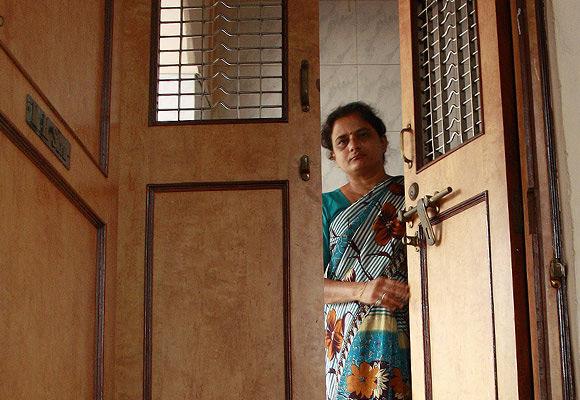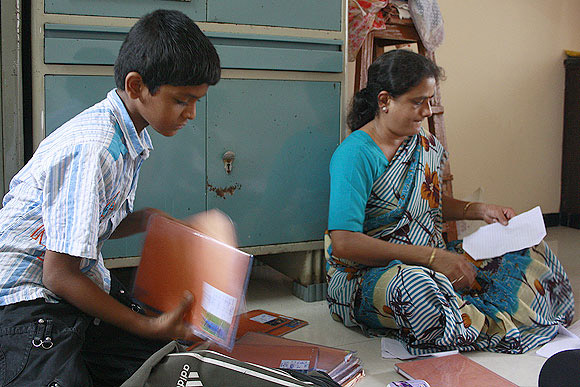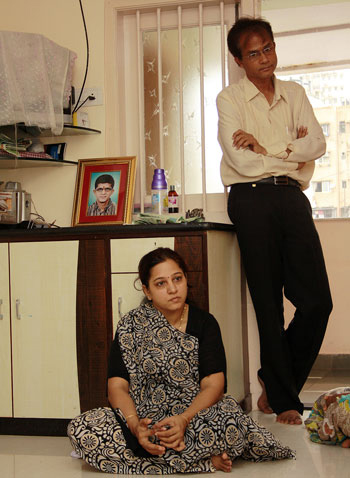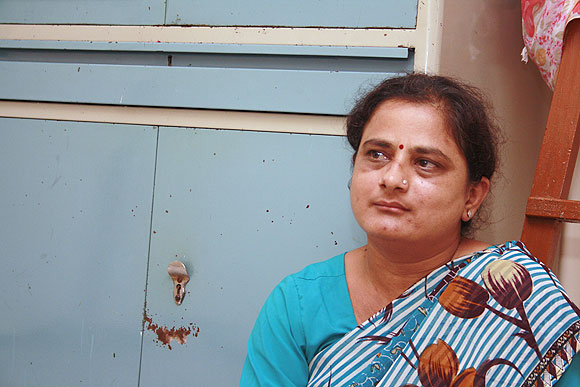 | « Back to article | Print this article |
'The value of life is only 2, 4 lakhs in India'
A year after her husband Mukesh died in a bomb blast in Mumbai, Sheela Seth and her nine-year-old son Mohit confront grief and an uncertain future, reports Archana Masih.
Photographs: Rajesh Karkera
When a city is assaulted by repeated acts of terror, its victims tragically become landmarks.
"Mukeshbhai? Who died in the bomb blast? He lives on the third floor," says the man at the entrance of an old building in Mumbai, with dark and narrow alleys awash with the monsoon rain.
"You come to the lane next to Central Plaza cinema and ask for the bomb blast victim," the voice at the other end of the telephone had said earlier that morning.
Sure enough, it was easy to find the home of Mukesh Hazarilal Seth, 44, who died in one of the triple bomb blasts in Mumbai on July 13 last year.
What was difficult was speaking to his widow Sheela, her eyes laden with tears as she gathered her son Mohit's books from the floor as the 9 year old readied himself to leave for tuition class.
"It is going to be a year, but our grief is life-long," she says, sitting on the floor, her back against a steel cupboard, "evenings is the time when the sadness is most overwhelming. That's when I feel most alone."
The room is small and sparse. On a table is a framed photograph of Mukesh Seth, with a garland over it. Two steel cupboards stand in one corner, a plastic mat on the floor, on which lie some of Mohit's drawings.
Click 'Next' to read further...
'How do you make a child understand that his father has died?'
'One of the hardest things was to explain our loss to Mohit. How do you make a child understand that his father has died? Children in his school have asked him questions like 'How do we know that your father has died in the bomb blast'?"
Children in their innocence can ask the cruelest of questions. But even more wrenching is Sheela's helplessness and fear about a future without a job to sustain herself and her young son.
She speaks softly and can barely be heard. A housewife after her marriage, she has found it hard to get a job because of insufficient educational qualifications. She has to pay her son's school fees of Rs 1,800 per month. Then there is the additional fees for his evening tuition.
Last year, Mohit's school had waived the fees considering her tragedy, but this year she has to pay part of the amount.
In keeping with the one year period of mourning that the family observed, Mohit did not attend any school trips or picnics last year.
Now that the mourning period is almost over, his uncle Shailendra feels the little boy may not be able to make any school trip because the family cannot afford it any more.
Please click 'Next' to read further...
'An ambulance on the road still reminds us of that day'
In a home shared by the joint family of 14 members, Sheela Seth's sisters-in-law sit alongside, recounting that night when ambulances with screeching sirens went up and down the street outside their homes.
They had heard the blast themselves and thought it to be a gas cylinder explosion at first. They discovered the tragedy had claimed their own when a man came by and shouted that Mukeshbhai had been injured in the blast.
"An ambulance on the road still reminds us of that day," says Sheela's sister-in-law Aruna who had gone looking for Mukesh with her other sister-in-law to the neighbouring Harkisondas Hospital while the men of the family went to the Saifee Hospital.
She had found him in the ICU, tubes attached to his body. It was around 10.45 pm. While they waited outside waiting for his brothers to join them, Mukeshbhai breathed his last.
They did not even know when he was moved to the morgue.
'Life comes cheap in India'
The state and central government compensation, along with financial assistance provided by some other charities, amounted to Rs 700,000, but Sheela's brother-in-law Shailendra, also a diamond broker, says the greatest help would be if Sheela could find a job and be self dependent.
The Tata Welfare Trust provided Rs 7,000 per month for the six months after the tragedy. He says the trust has been of great help and appreciates the dignified assistance.
"We can't say the same for many others -- politicians and business houses," says Shailendra, "Milind Deora (the local Congress MP) had sympathised with us when he met us at a function commemorating Rajiv Gandhi. He gave me his phone number and asked me to call him if we needed any help. I've called him two, three times but his phone has been switched off."
Shailendra says what is needed more in terms of compensation for the families of victims of terror is a job, or an alternate means of livelihood so that people can rebuild their lives.
"In the USA, you know how much was the compensation a child who lost four fingers when his fingers were jammed in a lift? Two million dollars!"
"Terrorism happens because of the loopholes in the government's security apparatus," he says, "But life comes cheap in India. It is worth only Rs 2, 4 lakhs here."



